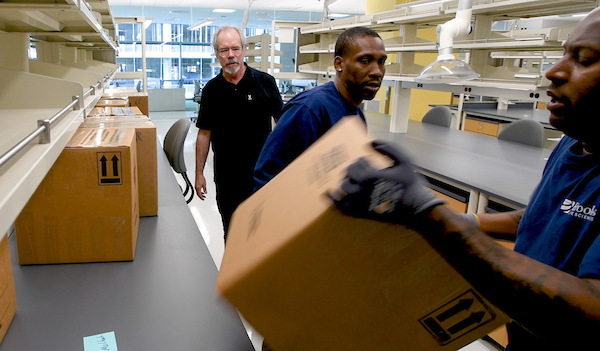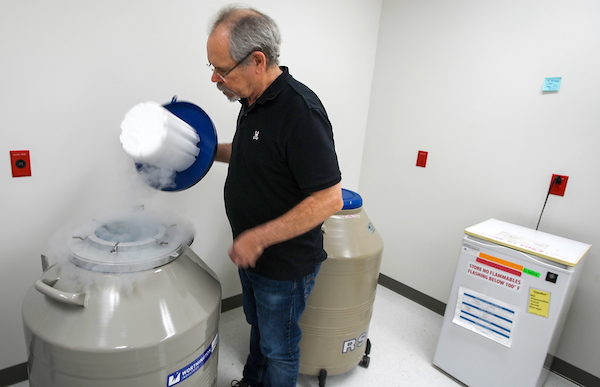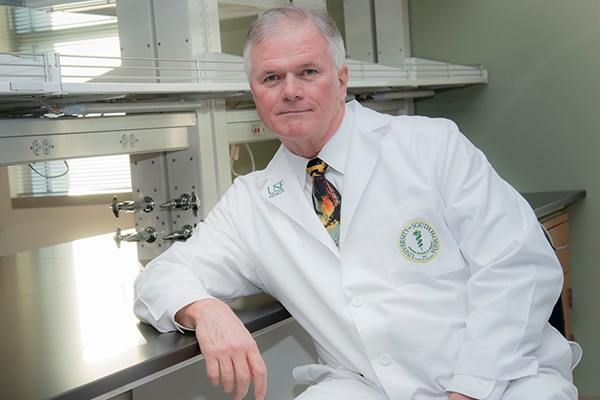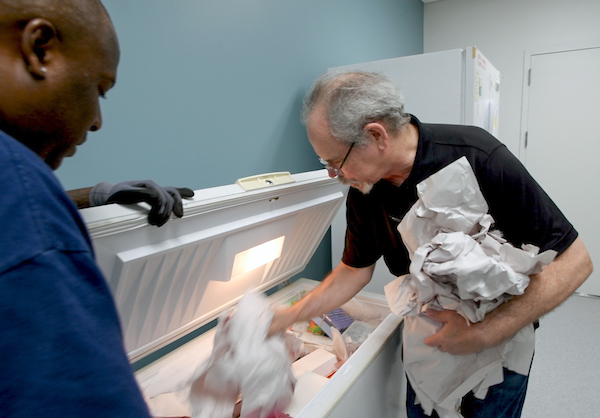The first six USF Health Heart Institute laboratories have begun the move into their new space on the 6th and 7th floors of the new Morsani College of Medicine (MCOM) building in Water Street Tampa.
It doesn’t happen overnight.
Planning began back in summer 2019 to relocate some of the current USF Health Heart Institute research teams, said Laura Pendleton, director of research laboratory infrastructure at USF Health

Physician-scientist Thomas McDonald, MD, oversees the move of equipment and supplies into his Heart Institute laboratory space in the new USF Health Morsani College of Medicine building. His lab one of the first to relocate to Water Street Tampa.
Working with MCOM Research leadership, Heart Institute principal investigators, vendors, USF Environmental Health and Safety, USF Facilities Management, USF Health Operations and other stakeholders, Pendleton coordinates safely moving the initial six laboratories to the new facility in downtown Tampa.
“There are all sorts of logistics – making sure the power supply is adequate and functioning correctly, ensuring that the freezers handle the transition into the new labs so that the biological samples are kept safe, getting the equipment safely to their new locations in the labs, and then integrating people into their new lab and office spaces,” Pendleton said. “We want the researchers to feel secure and confident that everything is being taken care with the new building systems, so as their teams move in they are ready to begin working.”
The staged move started Feb. 3 and will continue through March 6. It includes relocating millions of dollars’ worth of temperature-sensitive biological specimens, chemicals, supplies and sophisticated equipment, including some highly specialized microscopes and automated instruments requiring disassembly, crating, relocation and reassembly.
Among the first to move was the lab led by Thomas McDonald, MD, professor of internal medicine, and molecular pharmacology and physiology at the Morsani College of Medicine.
In late 2017 Dr. McDonald moved his laboratory from Albert Einstein College of Medicine in New York City, where he worked for 24 years, to USF Health Morsani College of Medicine in Tampa, Fla. “That was an emotionally wrenching experience,” he said.
A little more than two years later, for his lab’s 11-mile journey from the USF main campus in North Tampa to Water Street Tampa, he’s still diligent but better prepared and more relaxed.
“This is not my first rodeo,” said Dr. McDonald, whose team focuses on the genetic causes of cardiac conditions, including heart rhythm disturbances and heart muscle disease.
“Today we moved our freezers and refrigerators filled with many of our specimens, and that went pretty smoothly,” he said. “Some of these specimens have taken years to accumulate and generate and are irreplaceable. So it would be akin to having very rare artwork or coin collections you’d want to protect in a home move.”

Dr. McDonald checks the liquid nitrogen in some of his cold storage units after they arrive in his new lab. The living white blood cells he works with need to be kept at deep-freeze levels to remain viable for studies.
The biological specimens include human white blood cells induced into becoming stems cells that can develop into any cell type in the body, including heart and nerve cells. And they need to be kept extremely cold.
“It’s really important to have precise temperature control of the specimens when we’re making a move – even for a short distance. They are living cells and some require temperatures as low as minus 80 degrees Celsius, or even minus 200 degrees Celsius,” he said. “If the temperature rises to a level where (the cells) are still technically frozen, but not at a deep freeze level, when we thaw them out to use in our experiments they will essentially be ruined.”
Unlike older biomedical laboratories confined to single rooms, the Heart Institute features an open layout and lots of natural light provided by big windows. The building’s labs and high-tech collaborative hubs were built to accommodate interaction among all levels of researchers – from senior faculty and their staff to postdoctoral scholars, graduate students and medical students.
“Everyone is excited about being in this beautiful, new space that’s designed exactly for what we’re doing in the most modern sense,” said USF Health Heart Institute Director Samuel Wickline, MD, professor of cardiovascular sciences, and molecular pharmacology and physiology.
“In these open-design laboratories everyone can see each other, communicate well and share ideas,” said Dr. Wickline who shares lab space with Dr. McDonald in the new building. “That kind of proximity makes for good science.”

Samuel Wickline, MD, director of the USF Health Heart Institute, says the open design of the Institute’s state-of-the-art biomedical laboratories will encourage researchers to collaborate.
In addition to Dr. McDonald and Dr. Wickline, the first USF Health Heart Institute principal investigators with their laboratories based at the Water Street Tampa location, are: Ganesh Halade, PhD, professor of cardiovascular sciences (a new recruit from the University of Alabama); Travis Jackson, PhD, associate professor of molecular pharmacology and physiology; Stephen Liggett, MD, vice dean of research for MCOM and professor of internal medicine, molecular pharmacology and physiology, and medical engineering; and Ruisheng Liu, MD, PhD, professor of molecular pharmacology and physiology.
-Video and photos by Allison Long, USF Health Communications and Marketing

